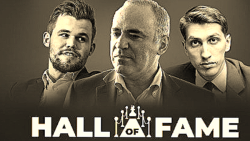
Masters of the Board: Chronicles of the Greatest Chess Geniuses Ever
07.02.2024 05:08 | HistoryCreating a list of the top 10 chess players in history involves delving into a rich tapestry of skill, innovation, and dominance within the world of chess.
These players are not just celebrated for their high ELO ratings but also for their contributions to the game, their era-defining performances, and the lasting legacy they've left in the chess community. Here's a detailed look into the top 10 chess players based on various criteria, including peak ELO ratings, dominance over their contemporaries, and historical impact.
%20(1).png)
Garry Kasparov - Often hailed as the greatest chess player of all time, Kasparov held the world championship from 1985 until his retirement in 2005. He reached a peak ELO rating of 2851 and was known for his aggressive and dynamic style of play. Kasparov was involved in several historic matches, including those against the IBM computer Deep Blue, showcasing the intersection of human and artificial intelligence in chess.
Magnus Carlsen - The Norwegian grandmaster has dominated the modern era of chess, becoming the world champion in 2013 and holding the highest ELO rating ever recorded, peaking at 2882. Carlsen is known for his deep understanding of all phases of the game and his ability to grind down opponents in seemingly equal positions.
Bobby Fischer - The American chess prodigy captured the world's imagination with his 1972 World Championship victory over Boris Spassky, which symbolized the Cold War chess rivalry. Fischer's peak ELO was 2785, and he is celebrated for his profound contributions to chess opening theory and his unmatched winning streaks in competitive play.
Anatoly Karpov - Karpov became the World Champion after Fischer forfeited the title in 1975 and held it until 1985, then regained it from 1993 to 1999 in one of the FIDE's versions. Known for his positional mastery and precise endgame technique, Karpov had a peak ELO rating of 2780.
Jose Raul Capablanca - The Cuban grandmaster was World Champion from 1921 to 1927 and was renowned for his natural talent, particularly in endgame play. His intuitive style and efficiency earned him the nickname "The Chess Machine."
Vladimir Kramnik - Kramnik defeated Kasparov in 2000 to become the Classical World Chess Champion and introduced significant innovations in chess theory. He is known for his deep opening preparation and solid play, reaching a peak ELO of 2817.
Viswanathan Anand - The Indian grandmaster became the World Champion in 2000 and then held the undisputed title from 2007 to 2013. Anand is known for his rapid chess skills and versatile play, achieving a peak ELO of 2817.
Mikhail Botvinnik - The Soviet grandmaster was World Champion on three separate occasions between 1948 and 1963. Botvinnik is considered a patriarch of the Soviet Chess School, contributing significantly to chess theory and training methodologies.
Emanuel Lasker - The German mathematician and philosopher held the World Chess Championship for 27 years, from 1894 to 1921, the longest reign of any champion. Lasker was known for his psychological approach to the game and his ability to play a wide range of openings successfully.
Alexander Alekhine - The Russian-French grandmaster was the World Champion from 1927 to 1935 and again from 1937 until his death in 1946. Alekhine was known for his fierce attacking style and for creating complex strategic traps.
These players have left an indelible mark on the chess world through their achievements, innovations, and the games that continue to inspire and instruct players of all levels. Each brought their unique strengths to the board, from strategic depth and opening innovations to exceptional endgame skills and psychological prowess. Their legacies are not just in their titles and ELO ratings but also in their contributions to advancing chess knowledge and making the game what it is today
PK
